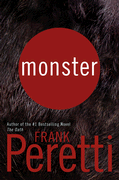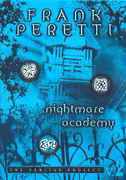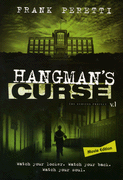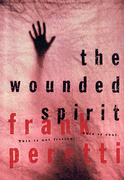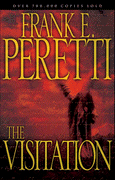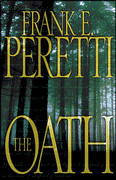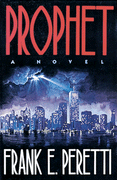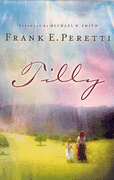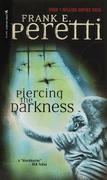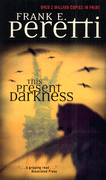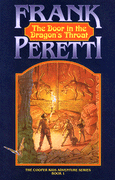

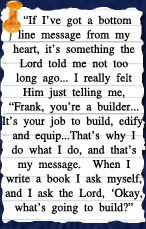
|
Focus on Fiction is pleased to feature Frank Peretti Frank is known worldwide as the Master of Supernatural Suspense. His bestselling books, including Monster, The Visitation, This Present Darkness, and others, have sold more than 12 million copies and garnered numerous awards. Prior to the launch of his writing career, Peretti spent time studying English, screen writing and film at UCLA and then assisted his father in pastoring a small Assembly of God church. Despite his tremendous notoriety, Frank still enjoys the simple things in life, such as carpentry, banjo making, sculpturing, bicycling and hiking. He is also an avid pilot. Frank and Barbara Jean, his wife of over thirty years, make their home in the Pacific Northwest. |
|
Focus: Frank, it’s a privilege to have you with us today! You’ve been described in many different ways, from recluse, to superstar, to one of the founding fathers of Christian fiction, but how would you describe yourself to someone who’s never met you? Frank Peretti: I guess I’m just a basically nice guy. I love the Lord Jesus. I love my dear wife Barbara. I’m basically good humored, and I try to spread as much kindness around as I can, because we can always use some more of that. I like humor. I like to laugh, and I enjoy people who are funny. If I was a stranger coming into a room and I didn’t know anybody, I’d probably be pretty quiet. I don’t really open up until I get to know people. Generally if I’m a room full of strangers I just kind of smile and don’t say anything. Focus: One of the best means most of us have to meet the real Frank Peretti is through your stories. Of all your books, the adult suspense, the youth adventure series, your adult non-fiction, and the children’s videos, which best conveys the bottom-line message of your heart? Frank Peretti: All of them! If you read through my books, you can almost tell where my mind and heart were at that particular time. For example, in the Darkness books, I was very much concerned with the encroachment of Neo-Paganism and New Age philosophy, and I wanted to encourage people in spiritual warfare, so that’s what I was thinking about. When I wrote Prophet, I was concerned about the brokerage of truth, and how truth has been marketed and changed and twisted, and how it’s important to love the truth for what it really is. And when I wrote the Oath, I was concerned about sin, and how sneaky and insidious sin can be. At the time there were some friends of mine who were involved in some sinful behavior that was destroying them. And they were supposed to be Christians, but it deceived them. So that’s what that came from. I dressed it up like a dragon, because the Lord said to Cain in Genesis, “Sin is crouching at the door, waiting to devour you, but you must overcome it.” The Visitation, that was, well, two things. It was kind of a semi-autobiography of my own journey as a Christian. My coming of age, you might say. My wrestling with doubt, and disillusionment, and coming through that and establishing my own faith for myself—outside of the particular Christian culture in which I was raised. Then of course there’s the driving story in there, which is false christs. When I did all of the kids books, each one of those conveyed a particular message. Basically, when you read a Peretti book, you’re going to get a message. That’s what I write for. And if I’ve got a bottom line message from my heart, it’s something the Lord told me not too long ago when I was trying to figure out ‘what is my role in all this?’ I really felt Him just telling me, “Frank, you’re a builder. You’re a builder. It’s your job to build, edify, and equip. So that was a nice tie-in. I think that’s why I do what I do, and that’s my message. When I write a book I ask myself, and I ask the Lord, ‘Okay, what’s going to build? What’s going to do the people some good out there?’ Focus: In your non-fiction book, The Wounded Spirit, you paint a heart-rending picture of yourself as a young, naked boy, quivering before your tormentors in a gym class. It’s been said that writing from the heart is like walking down the street naked. After enduring such shame and humiliation in your physical education class, how hard is it to expose the naked truths of your heart on paper? Frank Peretti: Well surprisingly easy. When it’s on paper. That’s part of being a writer, I guess. The Lord gave me a capacity to express myself in writing in ways I could never do verbally, or just talking or sharing with other people. I guess a lot of writers are that way. They’re very private about everything personal in their lives, they vent themselves through their stories. Now when I wrote the Wounded Spirit, that was about as close as I’ve ever come to actually being honest about myself in a direct, personal way. It’s interesting that I was pushing nearly fifty years old, and I never said anything about it. Never talked to anybody about it. And when the Columbine shootings happened, everything just fell into place, it was time to talk about it. I spoke about it to a big youth gathering, and then Doctor Dobson broadcast that talk on his radio show. And then the publishers said, “We need a book.” Then came the video, and a study guide and discussion questions. It grew into quite a big thing. Focus: You began devouring stories and watching movies from a writer’s perspective at a very young age. When did you realize there was such a thing as a career in writing? And did you know that’s what you wanted to pursue? Or did writing simply eclipse you from the inside out over time? Frank Peretti: I was made to be a writer, and I was always a storyteller and a writer from the time I was a kid. I would draw comics up in my room, I wrote stories on my mom’s power portable typewriter. I would tell stories to the neighborhood kids under the back porch. So that was in formation when I was real small and all the way through my childhood. It took a long time for me to really realize that’s what I was supposed to do. I knew there could be a career in writing, at least I thought there was. I mean Arthur Conan Doyle did it, and Mark Twain did it. Those were my some of my favorite authors back then. I remember thinking, ‘I would sure love to be another Walt Disney’. We loved watching the old Disneyland shows on TV. Davy Crockett, and all those wonderful stories, the Sorcerer’s Apprentice, with Mickey Mouse, Treasure Island. It was just so cool. And I was just caught up in the magic of all that. I still am. Because it just really resonated with me. I knew that’s what I wanted to do. There were distractions that came along as I lived life. I tried being a musician, and a carpenter, worked in a print shop, and I tried being in the ministry for a while. Focus: And you worked for a ski shop for a time, correct? Frank Peretti: Oh yeah, did that twice. Focus: It must have provided with you some great inspiration Frank Peretti: Well, all of that is living. You live and that’s how you learn. The Lord sends Moses through the wilderness to herd sheep for a while to prepare him. You know, He always prepares you. I’ll always remember the specific moment, though, right at the end of my tenure as a pastor, where I was just so miserable and felt so out of place. I remember my wife and I just got away, and we went on a little vacation. I remember sitting on a big high bluff looking out over the ocean, and it finally just came to me so clear, ‘You know, Frank, you’re only happy when you’re writing. You’re only fulfilled when you’re writing. You are a writer, and that’s what you need to do.’ I’d had several false starts through the years, but that was when I decided that was what I needed to do. Of course I already had This Present Darkness in several pieces and scraps of paper lying around. And I said, well, let’s go back home and try to make something of that. Focus: And thank God you did! Frank Peretti: Well, that was the one thing I had to do before I died. Focus: You did it well, that’s for sure! So then, from childhood you had an inclination toward writing, and also a fascination with monsters, how did your mother respond to your interest in these creatures? Frank Peretti: Both Mom and Dad started getting a little concerned. I mean, it was getting a little excessive. I had models, I had posters, I had comic books, I was writing stories about monsters, I was telling stories about monsters. The kids and I were playing monsters, you know, when we’d do our messing-around-playing-pretend thing. My brothers and I even built a whole mad scientist lab, with a monster laying on a slab and everything. Focus: Is this the monster that you put outside a store, and all kinds of people were stopping to try and figure out what it was? Frank Peretti: Yeah! It was great. We put him on a kid’s shoulders. This kid was about six foot tall anyway, and when he had the monster on his shoulders it would stand about eight feet, nine feet tall. He stood out on the street corner, with all the cars going by. We just wanted to see what would happen. We got some reactions. Fortunately we didn’t cause any wrecks! Focus: Your fascinating new novel, Monster, definitely draws us all into that childhood fascination. Would you be willing to give us a brief synopsis of the story? Frank Peretti: Reed and Beck, this young couple, are going on a trip into the deep woods to learn survival skills from a skilled Indian guide. But when they arrive at the little hunter’s cabin where they’re supposed to be taking all this training, the hunter’s cabin is ransacked and is broken open. And their Indian guide has met a very gruesome and untimely death. Without enough time to get back before dark, they have to camp there for the night, and of course during the night, they find that they’re being stalked. Something is out there. It’s making all kind of racket. So of course in the middle of the night, they’re fleeing from this creature, and it catches up with them, and carries Beck off into the darkness. The rest of the story goes from there. Focus: Which character, of all you’ve created in Monster, do you most hope your readers will learn from and understand? Frank Peretti: All four of them! Beck learns a valuable about being stretched and embracing challenges, about not letting her world be too small, and not letting her fear rule her. She really has to rise to the occasion, and often that’s how the Lord buffets and strengthens us, is through adversity, where we have to draw upon strength that we didn’t know we had, but the Lord wants to bring out. She’s the main character really, it’s her struggle. Reed has to go through a bit of humbling, to realize he’s not the big macho man and he doesn’t really know everything. He has to be ready to humble himself and learn and rise to the occasion, but as the Bible says, not to think more highly of himself than he ought to think, but to think soberly and to have sound judgment. Cap, now, he’s already done it. He’s a real good illustration of taking a stand for what is right, even though it may cost you. He lost his job and everything, but it was because he was right. Sing is a struggler, and an encourager. She’s the one who says, “Let’s do it. Let’s hang on, let’s rise above this, let’s not give up.” Even in the fact that she’s a Native American, but is a highly skilled forensic specialist. So her racial background, her ethnic background, even being a woman, she had a lot of cards stacked against her, but she prevailed through it all, because she’s a struggler. Focus: You included some other unlikely heroes in Monster, as well. As a mountain dweller in the Pacific Northwest, do you think Jacob, Rachel, and Leah are really out there? Frank Peretti: I think their existence is a reasonable possibility. There’s a little rule in science that says anything that has a beginning requires a cause, and that’s kind of an interesting thing to apply to this. One day there are no footprints, and the next day there are. By that scientific rule, if you find footprints that have appeared there, well, necessarily there is a cause for those footprints. Something put them there. And I can say that only a very, very, very tiny percentage of all the footprints found are fake footprints. Focus: Do you believe experiments to prove the theory of evolution, like those you described in the book, are taking place in the United States today? Frank Peretti: I don’t have any knowledge of anything like that. It’s possible of course, but that’s just part of the bigger problem. And that is how our science has been stunted and skewed by false assumptions. By scientists, who ought to know better, who actually approach the data with pre-set rules for their interpretation: If we find any data that contradicts the purely naturalistic explanation we’ll either ignore it or throw it out. We will only accept the naturalistic, materialistic explanation for any and everything. It’s ideologically driven. And that causes me a lot of grief. I’m thinking of all the fields of science—biology to astronomy, and physics and so forth—and I’m wondering how many incredible discoveries we could have made by now, if we had been willing to regard all of the data, and take an honest look at all of it, instead of sorting through it for what’s acceptable and what’s not. I think future generations will look back on our time as the Darwinian era, when science was stunted by dogma and supposition. They accuse Creationists of being dogmatic and for some that may be correct, but they are blinded to their own dogmatisms, which is very unfortunate. Focus: Monster is exciting not just because of the intriguing story line, but also because it is your first adult fiction novel in six years. Can you tell us what prompted your return to the adult fiction world? Frank Peretti: It was just about time I did one! I was involved in so many other projects over those six years. Hangman’s Curse being made into a movie, the whole Mr. Henry line of products for children, the Wounded Spirit project, the two Veritas books. I was wondering, man, six years, where did it all go? But my dear wife Barbara said, “Well, Frank, you were busy the whole time.” I wasn’t just sitting around. But then I had one more contract with WestBow for one more adult book, and the time came, and there it was. Interestingly enough, Monster was originally going to be the third Veritas book for young people. And it began to develop, and it looked to me like this could be a really good adult fiction book, the final book for the contract. So I got all excited, and we pitched it to Allen Arnold at WestBow and he got all excited. And the rest is history. Focus: The Hangman’s Curse, which you mentioned earlier, was released as a full-length movie. What was it like to star in a movie made from a book you wrote? Frank Peretti: That was kind of a dream come true, because I’ve always wanted to be in a movie. It was great. It was a whole different kind of an animal, because generally I’m more of a stage performer than a film performer, at least up until this point. When I speak I’m very animated, and when I did Mr. Henry, that was even worse, you know, because I was doing that for little kids, so I was real nutty. Energetic. The movie term for that is ‘over the top’. So anyway, when I was acting in the movie, that was one thing I had to learn. Because now you’re on camera, and your face is going to be, like, thirty feet tall in front of the people in the theater. You have to be a lot more subtle. Play it from the inside a lot more. And so I got that direction from the director more than anything else. “Frank, tone it down. Tone it down!” But I loved it. I want to do it again. I was going to be in The Visitation, but I couldn’t get down there for the filming because I had to get Monster done. But the next time we do a movie, the book is going to have to wait, and I am going to be there. I love making movies. I started out wanting to make movies. I wanted to be a film writer, or a director or something. I even started going to UCLA to learn filmmaking. When that didn’t work out, I decided, ‘well, it’s a lot cheaper just to write it as a book’, and so I became a novelist instead. In a way I’ve come full circle. I started out wanting to be a moviemaker, and I wrote books that ended up being made into movies, so now I’ve got the best of both worlds. Isn’t that the Lord for you? Focus: Before The Hangman’s Curse was made into a movie, and before your Veritas Project series, and your Cooper Kids adventures, and The Wild and Wacky World of Mr. Henry videos, you blasted onto the scene with your intense spiritual warfare stories, This Present Darkness, and Piercing the Darkness. Many of my readers have asked about the personal experience behind those books. How much of what you wrote—angels, demons, spiritual battles, etc—came from things you’d experienced yourself? Frank Peretti: The truth is I didn’t really experience any of this stuff first hand. But I did research a lot. I started out, of course, by reading what the Bible has to say about angelic warfare, particularly in the book of Daniel, where the angel had to fight the prince of Persia to get through, and after he leaves, he has to fight the prince of Greece. I studied the description of angels in the Bible. I tried to write within Biblical parameters, as much as I could. Now the rest of it comes from the experiences of other people, and in some cases I had to be careful sorting them out. My brother Terry was a real good source for some of this. As a matter of fact, some of Hank Bush’s experiences are based on what happened to my brother. Because he was, well he still is, a missionary in Italy, and over there there’s a lot of occultism. The whole European kind of gothic, dark religion. So Terry was dealing with drug addicts at a Teen Challenge center, and some of them, either directly or by their parents, had become demonized, and he was casting out demons and talking about it, so that was one aspect of it. Besides my brother, I spoke with other ministers, and missionaries, people that I respect. So that’s where that direct stuff comes from. In terms of what the angels look like, and what the demons look like, that is half tradition, another part of it is eyewitness accounts, which of course you take with a grain of salt, and then the other part would be my imagination. So that’s where it all came from, and then of course all the other research comes to bear on that. The new age, and neo-paganism, in the first book, and then in the second book you had that working in the public schools and the legal system and so forth. I used to tell people, I’m not really a soldier in this battle, I’m the war correspondent. I write down what people tell me. Focus: I can only imagine the feedback you’ve received over the years about these books. Is there one particular letter or comment you’ll never forget? Frank Peretti: They all run in kind of the same vein, which is, “It really opened my eyes to understand spiritual warfare.” Universally, I’ll hear, “It changed my prayer life. I feel so differently now. I understand what is going on. I can envision and see what the battle is like.” Others have been going through real trials in their lives. Trials in their marriage, or in their jobs, in their town. Many times I’ve gotten letters from people that say, “You wrote about our town.” Literally everywhere I go in the country, I hear, “You wrote about our town.” I don’t know whether to feel kind of haughty, like, ‘Well, I’m not bad!’ or just say, ‘Oh no.’ Focus: Speaking of letters you’ll never forget, I understand that fourteen publishers sent you rejections of This Present Darkness prior to Crossway offering you a contract. Were any of those rejections especially memorable or disheartening? Did you save them all, like most writers do? Or turn them into confetti for your cat box? Frank Peretti: No, I did save them. Matter of fact, I won’t mention any publishers’ names, but some who are publishing me now, sent me a rejection letter the first time. I said that to them, I said, “Hey, remember this?” But the one that I remember was the one I got from Crossway. Focus: The one saying yes? Frank Peretti: No! It said no. That’s what makes it interesting. Crossway actually wrote me a nice letter and said, “Well those are very interesting ideas you have, but it’s just a little outside of our publishing needs right now”, or however they phrased it. But they were encouraging. They said it was a good idea. What’s interesting about that is that I then sent them the first of my Cooper Kids books, The Door in the Dragon’s Throat. Focus: And this is before This Present Darkness was published? Frank Peretti: Oh yeah. This Present Darkness got rejected by Crossway and then I sent them The Door in the Dragon’s Throat, and they read that, and liked it. They wrote back, and they said, “We’d like to publish that book, that was good.” And in the same letter, they said, “And by the way, you earlier sent us this other manuscript, can you send it back? We’d like to take another look at it.” I hadn’t really finished typing it up yet, and so Barbara and I, and Barb’s mom, we had three typewriters going—this was back in the day of typewriters—and it sounded like a newsroom, with all the typewriters going like crazy. We typed up a seven hundred and some odd paged manuscript, and put it in a box that our church bulletins came in, and sent it off. And a couple months later, I got a call from Jan Dennis saying, “Yes, we’d like to publish it.” It’s kind of interesting now. I’ve been told that someone took a tour of Crossway offices, and the tour guide said, “This is the building that Darkness built.” I don’t know how true that is. Kind of a legend, I guess. Focus: Your wife, and high-school sweetheart, Barb, has been with you through this whole journey, and has ridden the waves of obscurity and fame by your side. What advice do you think she would give to all the writers’ spouses out there? Frank Peretti: I think she would probably say that the best thing to do is to be there for them. Writing is lonely and sometimes it can be scary, and the writing spouse needs all the encouragement they can get. It can be pretty tough sometimes. Even if you’re a successfully published writer, you can just agonize over a book, trying to get it to work, or trying to get over a block, or trying to get an idea. But you know Barb, when I come in all frustrated because I can not get something to work and I don’t know where I’m going to go, she’ll say, “Oh, you’ll figure it out, you always do.” That’s what it’s all about. I was just reading a book by Stephen King, On Writing, and he talks about Tabitha, his wife, and how she is exactly that kind of a force in his life. I thought that was cool. Focus: Thank you very much for your time, Frank. In closing, is there anything else you would like your readers to know? Frank Peretti: I’d like them to know that I love them, that I see their faces when I try to think of my next book, and that I’m writing for them. I’m a builder. God called me to be a builder. To build the body of Christ. To edify, and to equip. And so, I’d like them to be praying for me, because every book I write has a message that’s written for them. So I’m always wondering, ‘Well, Lord, what do they need? What do they need to hear?’ My readers can pray in that vein, that the Lord would help me to hear His voice, and to write for them.
|











© Focus on Fiction, 2003-2006 All Rights Reserved. Site maintained by PulsePoint Design. Direct questions or comments here
| Home | Upcoming Author Interviews | Past Author Interviews | Christian Fiction Reviews | About Us | | FAQ’s | Contact Us | Links |
